Sunday Reflections: Where’d you go, VOYA?
Some awful things are being said by an organization that I idolized. I first discovered VOYA in the LIS Library at the University of Illinois in 2001 and reported back to my Young Adult Literature Class as if I’d just struck California gold.
Did you know? I asked, Did you know there’s a journal called Voice of Youth Advocates and it’s all about teen services?”
I pored over the articles. In those months overwhelmed by reading assignments, I checked out back issues and read just because. I saw names that I committed to memory. Names of authors to seek out when considering collections. Names of librarians doing good work. Names of libraries with vibrant teen services and spaces. Though I never wrote for VOYA, it felt like it was mine. It was a journal that was solely concerned with the field of librarianship in which I worked. Unlike Booklist or School Library Journal which reviewed YA titles and included some content pertaining to YA librarianship, or the YALSA journal which was connected to ALA and had to hove to the priorities of a larger organization, it had a singular and piercing focus.
ADVERTISEMENT
ADVERTISEMENT
It felt a little bit radical.
Then I read about its founders, Mary K Chelton and Dorothy Broderick, and was in awe that such a powerhouse presence in the YA library world got its start from two people and $400 in donations. It made me feel like good, big things can happen when people believe in them enough. That was a long time ago now. The founders retired, Dorothy Broderick passed away, new editors have taken, then passed the reins, and that brings us to the present.
The awfulness started in earnest on Thursday. On Thursday, I got angry about the attitude and disregard thrown at individuals, Tristna Wright in particular, who pointed out aggression and hurtfulness in the review of Kody Keplinger’s Run. We at Teen Librarian Toolbox released the following statement:
Then it didn’t get better. It got worse. Much worse.
I was angry that people weren’t being heard, that people weren’t listening, and that teens were potentially viewing this all unfold minute by minute on social media, watching professionals who stand under a banner of youth advocacy slinging invective about sexual orientation, gender identity; employing marginalization, tone policing, and othering in their responses.
There is a lot to be angry about. A lot of people heard a lot of awful things said in awful ways. If you’re still angry, I can stand with you in your anger and validate that feeling because that feeling is valid.
But I’m not angry anymore, I’m sad.
I’m sad that a legacy founded in part because of the exclusion of teen services from the library conversation is now tarnished by creating an atmosphere of exclusion.
I’m sad on a very practical level that the most efficient tool I had in my collection development drawer is now in peril and I worry about how that will impact my ability to serve my population well on my limited time.
ADVERTISEMENT
ADVERTISEMENT
I’m sad that GLBTQIA folks in general and bisexual, genderqueer, gender nonconforming folks in particular have been treated like little more than Googlable curiosities, and that their identities are being conflated with sexual activity when it comes to age ratings. There are plenty of venues to turn to if you need to “shield” your patrons or children from content that doesn’t jive with your worldview. VOYA, and other professional library review sources, should never be the place for that. We pinned our faith on VOYA being the journal that we could count on to put teen readership at the forefront of their reviews, taking into account literary quality and popularity in equal measure, regularly featuring teens themselves as columnists and reviewers. How did we get here? Because it’s not where VOYA came from. Roger Sutton was right: they may be in the midst of this awful, dismissive, unprofessional conduct, but once upon a time VOYA was groundbreaking:
And VOYA was right about one thing: it doesn’t define their past. But it is defining their present and it will define their future.
This is a pivotal moment for the journal, the ethic, the movement, the advocacy organization that so many of us have relied upon. It’s an opportunity for evaluation, change, renewal, regeneration, and a harkening back to its origins: a focus on the needs of teen librarianship and a dedicated space for authentic and accurate reviews of the books teens want, need, and deserve.
I don’t delight at this miasma of out of touch messages and social media misfirings. It’s embarrassing for those of us who have considered VOYA as a partner in our work and for those who have been proudly affiliated with the journal in its better days. It’s disappointing that they’ve given us ample reason to mistrust their editorial judgement. It’s sad that our field has lost a voice that we counted on.
It will take a lot [seriously a lot] of work to regain the trust lost, but for a journal that began with its mission being dismissed as one with “nothing to say” I believe–I hope–that in the right hands, it can overcome this. And if not, I’m encouraged that in the same spirit of carving out space for teen advocacy, new voices are emerging and will continue to emerge and rise to the challenge.
Links of interest:
Amanda reviews Run by Kody Keplinger for TLT
Teens Review Kody Keplinger’s Run Suspense and More in SLJ
Bisexual Books has been following the issue on their site
Getting Called Out: How To Apologize on Youtube
Flickering the Gaslight: Tactics of Organized Online Harassment from Model View Culture
Filed under: Sunday Reflections
About Heather Booth
Heather Booth has worked in libraries since 2001 and am the author of Serving Teens Through Reader’s Advisory (ALA Editions, 2007) and the editor of The Whole Library Handbook: Teen Servcies along with Karen Jensen.
ADVERTISEMENT
ADVERTISEMENT
SLJ Blog Network
One Star Review, Guess Who? (#202)
This Q&A is Going Exactly As Planned: A Talk with Tao Nyeu About Her Latest Book
Exclusive: Giant Magical Otters Invade New Hex Vet Graphic Novel | News
Parsing Religion in Public Schools
ADVERTISEMENT


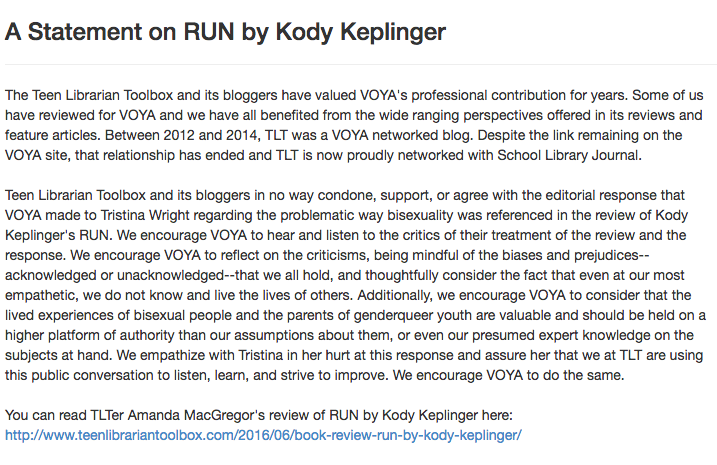
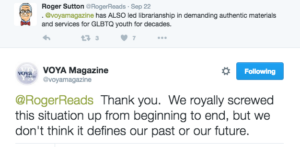

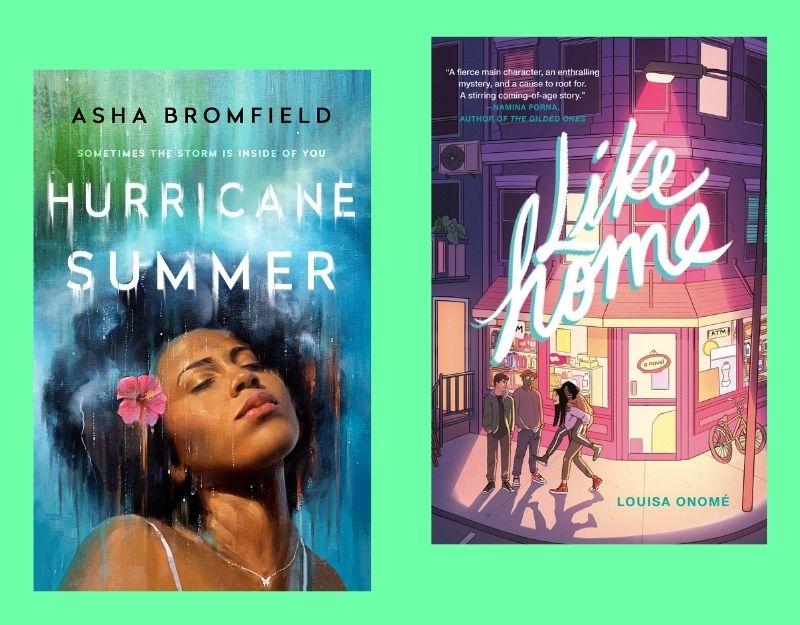
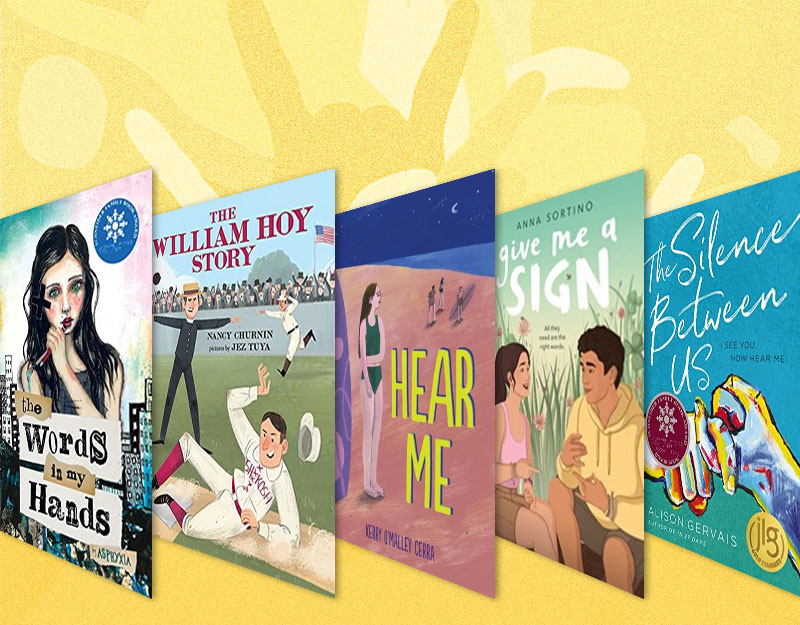
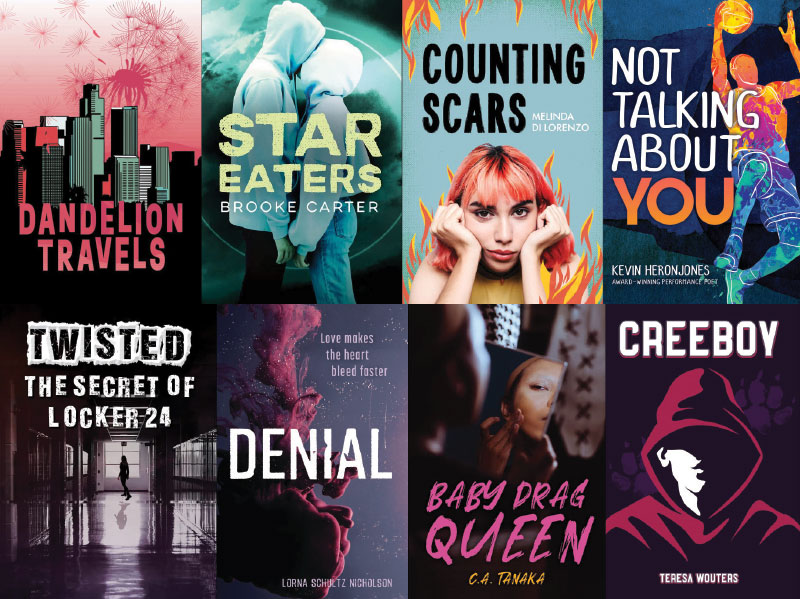


It’s been the proverbial slo-motion train wreck. I share your sadness, but I’m also not surprised. There have been advances made in the past couple of years, but the truth is that books like Run still face an uphill battle. To be honest, I was initially disappointed that Voya didn’t review The Other Boy. Being overlooked by a major reviewer specific to librarians could be a crushing blow for an LGBTQIA book, especially one without a huge marketing budget that’s largely relying on word of mouth. Now, I have very mixed feelings. I worry that they would have had a similar response to a book about a young trans boy, especially since much of the book is about him experiencing his first crush.
I think “royally screwed this up” is an understatement. When I first read their comments on the issue, the comments were so absurd as to be unbelievable. My first reaction was that their account was hacked by a troll.
It should be noted that VOYA was purchased in 2010 by E L Kurdyla Publishing. In my opinion, the whole tone of the magazine changed then.
I believe Chelton and Broderick were a couple. I know that originally reviews tried to avoid much in the way of content regarding language, violence, sex or sexuality and ried to focus on quality of writing. so perhaps you have it right. things have changed and not for the better.
Where can I get a list of teen librarians?
Thanks,
B. Lynn Goodwin
Writer Advice Managing Editor, http://www.writeradvice.com
Author of YOU WANT ME TO DO WHAT? Journaling for Caregivers & Author of TALENT
blynngoodwin.com